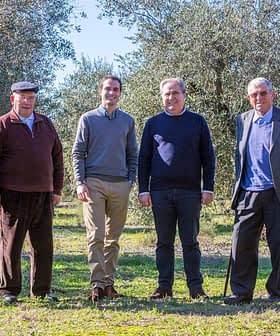Le reazioni sottolineano la lunga strada da percorrere per Super Premium

È stata una bella giornata per l'olio d'oliva nelle notizie. Articoli sull'argomento sono stati pubblicati ieri su due dei giornali americani più letti: il Washington Post e il New York Times.
Il titolo di The Times articolo deve aver inviato un caloroso ping attraverso il cuore dei produttori di olio d'oliva della California che hanno impostato i loro siti per eliminare la quota di mercato del 99% di cui godono gli esportatori europei.
"California's Olive Oils Challenge Europa ” era il modo in cui il titolo appariva online, mentre in stampa, è stato leggermente accorciato in "Oli di oliva importati sfidanti. " Ad ogni modo, era una rubrica molto apprezzata da molti nel Golden State.
Ma l'articolo ben scritto è stato piacevolmente equilibrato quando tanta copertura del dramma sull'olio d'oliva del Vecchio contro il Nuovo sa di interesse personale e sensazionalismo.
Gettando i freni su quello che sembrava l'ennesimo rifacimento di studio Davis dell'anno scorso, Nancy Harmon Jenkins (cast indirettamente come un "Old World Partisan "- è quello sul tuo biglietto da visita Nancy?) Motivato, "Non puoi decidere che tutti gli oli importati sono sospetti e respingono migliaia di anni di arte. "
Un altro scambio è iniziato con l'importatore di olio d'oliva di New York Martina Rossi Kenworthy, secondo quanto riferito, affermando che l'agricoltura ad alta densità sostenuta da New World ha derubato gli alberi di nutrienti vitali. Questo è stato chiamato "sciocchezze” del consigliere agricolo di Davis Paul Vossen. Ma l'equilibrio è stato ritrovato con una valutazione cauta di Deborah Rogers, che ha dichiarato: "Possono produrre buoni oli ad alta densità, ma resta da vedere se riescono a produrre oli eccellenti ”.
Attenendosi inutilmente al playbook standard dell'articolo sull'olio d'oliva, The Times ha concluso la storia con un test del gusto. Questa è stata guidata dall'importatore newyorkese Kenworthy e dal suo collega di Gustiamo, Stefano Noceti, che, non a caso, hanno potuto individuare in un blind test i propri top seller italiani tra i pochi campionati. Ma forse in un esitante cenno all'inevitabile, gli è piaciuto anche il California Olive Ranch Arbequina.
In un ritornello moderno, la scrittrice del Times, Julia Moskin, ha ammesso di esserlo "melodrammatico ", olio d'oliva, ha scritto, "deteriora” appena imbottigliato. Sebbene scientificamente vero, un lettore medio ha l'impressione di poter assaporare la differenza tra un olio extra vergine di oliva imbottigliato otto mesi fa e uno imbottigliato due mesi fa (e sapere quale preferire) - o quell'olio d'oliva di alta qualità , se un anno nella sua durata di conservazione, sarà l'ombra di se stesso e significativamente meno salutare.
L'articolo, tuttavia, ha lasciato ai lettori un valido consiglio: il gusto personale e la freschezza sono le migliori guide nella scelta dell'olio d'oliva giusto.
I Articolo del Washington Post, scritto da Jane Black, letto come un opuscolo per il Associazione 3E - l'iniziativa guidata da Paulo Pasquali di Villa Campestri, il vicepresidente del Culinary Institute of America Greg Dreschner, l'educatore milanese Claudio Peri e il CEO di Gaea Aris Kefalogiannis - e la loro offerta per definire il livello più alto della qualità dell'olio d'oliva.
"Il 73 percento delle prime cinque marche di olio extra vergine di oliva importato non è riuscito a soddisfare gli standard internazionali accettati per l'extra-vergine ”, ha commentato l'articolo, incapace di resistere a partire da un'altra recensione dello studio di Davis e lasciando molti grattandosi la testa a ciò che Il 73 percento dei cinque eguagliava.
Entrambi gli articoli contenevano interviste con l'autore investigativo giramondo Tom Mueller il cui tanto atteso libro Extra Virginity è in uscita a dicembre e vale la pena aspettare.
Ma mentre l'articolo del Washington Post esaminava il significato perduto della classificazione extra vergine, la necessità di una nuova certificazione per la vera qualità dell'olio d'oliva e come avere un EVOO "epifania", i lettori si sono in gran parte attaccati al cartellino del prezzo, esprimendo sconcerto e fastidio nel loro Commenti.
"Non posso acquistare olio d'oliva premium con il mio budget per la cucina di tutti i giorni, così come non posso acquistare vino d'annata premium ", si è lamentato un lettore, "Con che cosa dovremmo usare per cucinare - non necessariamente adorare? ”
Un altro ha detto "Pagare così tanti soldi per una quantità così piccola di qualcosa mi sembra piuttosto folle, a meno che non sia sufficiente per aromatizzare circa 200 pasti o qualcosa del genere. "
Mentre alcuni commentatori sono intervenuti con i ricordi delle vacanze toscane o con i loro assaggi di cucina, c'è stato poco sostegno tra le poche decine di lettori per il concetto super premium o per i prezzi super premium.
Un lettore ha scritto, "Suona come una racchetta, progettata per 'Age of Affluence 'che ora è finita. $ 50 / mezzo litro. Questo è il fallimento in una bottiglia. Lasciare il 'super-premium 'per i racket di Wall Street e gli yuppies che non sanno niente di meglio. Il gusto è soggettivo: un buon vino da $ 100 non ha un sapore migliore di un buon vino da $ 11, abbastanza con lo snobismo alimentare. Siamo in depressione! "
E in un commento divertente e tragico, un lettore ha chiesto, "Che tipo di olio d'oliva usa McDonald's? Tutta la loro roba ha un buon sapore. "
I lettori più accesi sono spesso sovrarappresentati nelle sezioni dei commenti. Tuttavia, le reazioni potrebbero sottolineare la strada difficile da percorrere per l'iniziativa super premium, soprattutto negli Stati Uniti, dove i consumatori sanno poco dell'olio d'oliva, tanto meno perché dovrebbe costare più di due dollari per cucchiaio.
E proprio mentre l'International Olive Council ha dato il via al suo tanto atteso Nord America campagna promozionale che privilegia l'olio di oliva alla moda in un momento in cui Gli americani non potrebbero sentirsi peggio per il loro futuro economico, il tono aspirazionale del superpremier affronta lo stesso pubblico difficile.
Gli esperti di marketing dovranno prima spiegare agli americani che cos'è l'olio d'oliva e come utilizzarlo, prima di avere molto successo con l'upsell.





